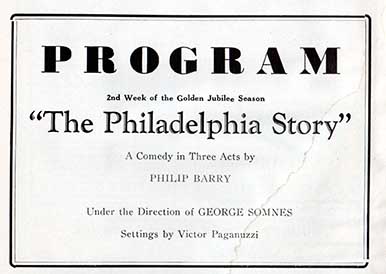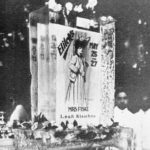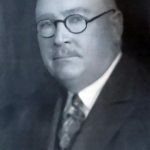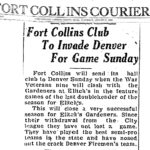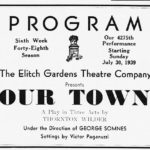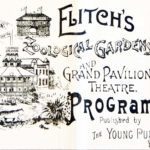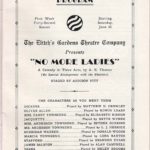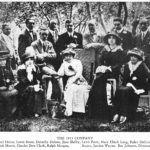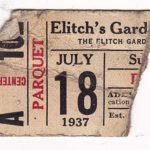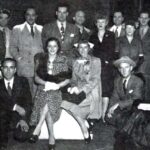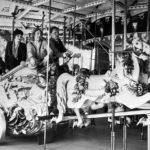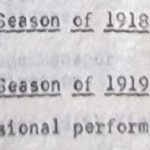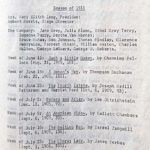The drama editor of the Rocky Mountain News detailed the events of the 50th anniversary season at Elitch Gardens in an article bearing the headline, “Capacity Crowd Marks Elitch’s Jubilee Opening.”
The Golden Jubilee got under way a half hour before the scheduled radio broadcast from the stage, with Mrs. A. B. Gurtler breaking through a paper barricade across the lobby of the theater for benefit of camera.
A crowd of well-wishers had already assembled and the Theatre was filled to capacity with an audience ready to celebrate the occasion. Bide Dudley, New York drama critic and formerly a Denver newspaper reporter, officiated as master of ceremonies during the radio broadcast carrying the celebration throughout the country. In attendance were Governor Ralph L Carr, Mayor Benjamin Stapleton, other state and local officials and representatives of society, business, the professions, arts and sciences and the military service. Emcee Dudley introduced Governor Carr, who told of his first thrill at Elitch’s – riding a Shetland pony. Mayor Stapleton praised the Theatre and added that he’d been coming to see stage plays for some thirty years. Cornelia Otis Skinner, the great actress, came from Evergreen, Colorado to add her loveliness to the celebration and brushed away a tear when she recalled that her father, Otis Skinner, appeared at Elitch Theatre 30 years prior.* Producer-Director George Somnes proposed a toast to Mary Elitch, founder of the Theatre, and to John Mulvihill, who carried on its tradition. Arnold Gurtler was the final speaker before the Theatre darkened for the first performance of the 50th season – Samson Raphaelson’s comedy, Skylark. The history and traditions of the oldest stock company in America were shared. Patrons of the Theatre were given an Elitch Gardens Golden Anniversary Souvenir Program (1891-1941) commemorating the event. Among its contents was a letter from Mayor Benjamin F. Stapleton to A. B. Gurtler with the following remarks:
Elitch Gardens Theatre is a part of Denver and a very fine and important part. The Theatre has provided Denver with the highest class of entertainment and many of America’s most famous artists of today started their careers at Elitch Gardens.
Our citizens look forward each season to the opening of Elitch Gardens Theatre with unusual interest and our people are a unit in declaring “There Must Always Be An Elitch Gardens Theatre.”
And with the preliminaries out of the way, the curtain rose on the sophisticated comedy, Skylark. Thus ended the Elitch Gardens Theatre celebration of the fiftieth anniversary opening night, an evening that would have stirred the hearts of Mary and John Elitch and John Mulvihill. In addition to the dignitaries that appeared for the golden anniversary festivities, the traditional Monday night theater audience that for many years was the important social gathering of every week resumed for the opening summer season and for the golden jubilee celebration. For example, Mrs. Lawrence C. Phipps attended with her husband, Senator Phipps, and wore a soft green wool costume and a pink flower hat. Miss Eleanore Weckbaugh wore a flame-colored, snug fitting crepe gown. The season ran for eleven weeks, one week longer than the usual Elitch season. Donald Woods was the leading man and Ruth Matteson the leading woman. The Golden Jubilee Theatre Program stated of Donald Woods:
It’s natural that Mr. Woods should have a sincere affection for the old stage of the famous Theatre, as it was here, in 1933, while playing in The Pursuit of Happiness that he was discovered by a motion picture scout and given a Hollywood contract. He skyrocketed to fame immediately and is known everywhere today as one of the screen’s most popular leading men.
Ruth Matteson played the leading feminine roles of the season that had been performed by well-known actresses in the Broadway productions of Skylark (Gertrude Lawrence), The Philadelphia Story (Katherine Hepburn), The Little Foxes (Tallulah Bankhead) and Ladies in Retirement (Flora Robson). The newspaper reviews favorably embraced each of her performances. For example, she was described as “exuberant, dynamic, a bit of a beauty and an excellent actress,”3 “whose enthusiasm makes one believe everything she says and does.” After being honored to be selected as the leading lady for the golden jubilee season, Ruth Matteson would again return to Elitch as the lead in 1942, 1948, and 1949. Among her qualities for the role of a successful leading woman in summer stock were the following:
She was a “fast study,” with the ability to learn and retain a leading role in a minimum of time; she also possessed patience, a rare “spirit of cooperation,” and a dependability which made her fellow-workers uncommonly secure. According to director George Somnes, Miss Matteson, even in rehearsals, never “walked through a role,” a phrase describing a listless, routine interpretation. During the first three days of rehearsal, she spent as much time as possible perfecting the mechanics of memorization, and during the final three days of rehearsal, the actress worked for the refining qualities of timing, coordination, and “sharpening the listening aspects.” It was the latter quality, according to Somnes, which made her equally appealing to audiences and to fellow actors.
It is difficult to imagine a better selection of plays to honor the golden jubilee season. Audiences would long remember Golden Boy (1937), the story of an American-born Italian boy who is torn between two life interests – becoming a violinist or fighting his way out of the slums as a prizefighter. The play was made into a film of the same name in 1939 starring William Holden in his breakthrough role and also served as the basis for a 1964 musical. Likewise, The Philadelphia Story (1939) would long remain a favorite. It played on Broadway for 417 performances with Katherine Hepburn in the principal role of Tracy Lord. Playwright Philip Barry wrote the comedy with Katherine Hepburn in mind. It was made into a successful film in 1940, starring Hepburn, James Stewart, and Cary Grant. It was successfully revived on Broadway in 1980. These and other plays, such as The Man Who Came to Dinner by George S. Kaufman and Moss Hart, The Little Foxes by Lillian Hellman, The Show Off by George Kelly and Private Lives by Noel Coward, contributed to making this golden jubilee season one to be remembered.
[Borrillo, T. A. (2012). Denver’s Historic Elitch Theatre: A nostalgic journey (a history of its times). Colorado. p. 197-199]
Theatre Staff:
- Arnold B. Gurtler, President and Treasurer
- Marie M. Gurtler, Secretary
- George Somnes, Director
- Lucian Self, Stage Manager
- Victor Paganuzzi, Scenic Director
Resident Company:
- Ruth Matteson
- Viola Roache
- Jacqueline de Wit
- Helen Bonfils
- Augusta Dabney
- Donald Woods
- Arthur Gould-Porter
- Richard Irving
- Lawrence Fletcher
- Emmett Rogers
- Fred Sherman
- Frank Jacquet
Productions:
- Week of June 16: Skylark, by Samson Raphaelson
- Week of June 22: Golden Boy, by Clifford Odets
- Week of June 29: The Philadelphia Story, by Philip Barry
- Week of July 6: The Royal Family, by George S. Kaufman and Edna Ferber
- Week of July 13: The Male Animal, by James Thurber and Elliott Nugent
- Week of July 20: The Man Who Came to Dinner, by Moss Hart and George S. Kaufman
- Week of July 27: The Little Foxes, by Lillian Hellman
- Week of Aug. 3: The Show-Off, by George Kelly
- Week of Aug. 10: Mr. and Mrs. North, by Owen Davis.
- Week of Aug. 17: Ladies in Retirement, by Edward Percy and Reginald Denham
- Week of Aug. 24: Private Lives, by Noel Coward

